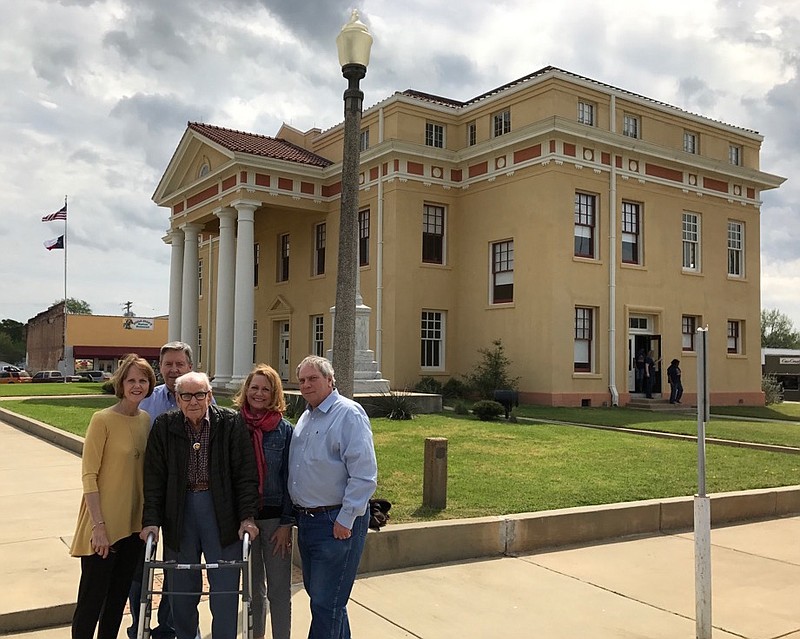Connor Patman of Texarkana, son of the late U. S. Rep. Wright Patman, returned to Linden on March 24 to celebrate his 97th birthday in his native hometown.
Photo Gallery
Bryson Van Cleve @ West End
The Bryson Van Cleve band performs for a packed house on Saturday, February 9.
Connor was born here March 24, 1920, the first child of Merle and Wright Patman. Connor's father became this region's most powerful and long-serving U.S. representative from the late 1920s to 1976.
Connor lived here in his early childhood. After the family moved to Texarkana, he continued to visit his grandparents, who for many years ran the Patman Motor Courts on North Main Street.
The family requested local historian Sue Lazara to lead them on a day tour of Linden.
"Memories of Wright Patman still permeate Linden," Lazara said. "He initiated many of Linden's significant buildings, infrastructure and institutions."
Special places visited were:
- The Patman family residence from 1919-1936 at 305 N. Main St.
- Wright Patman's law office building, at 101 S Main St. (corner of Houston St.), which he occupied from 1919-1926
- The 1934 Water Tower with Sanitary Water/Sewer System, 110 East Rush St., built with funding had been secured by Patman.
- The 1930s Columbian fire hydrant installations in downtown Linden, also secured by Patman.
Patman also began Linden's Boy Scout organization and its American Legion Post. He assisted in the 1937 Linden Federal Post Office and the 1938 Cass County Building.
The tour finished with an inside look at the historical Cass County Courthouse where Patman practiced law and served as county attorney and district attorney. There, he honed the prosecutorial skills he would take to Washington, D.C. and use as legislator and congressional investigator.
Patman's mark on this building in 1934 when he helped secure federal funding to reclaim the building after a serious courtroom fire caused the building roof to implode.
Lazara said she had reviewed Patman's accomplishments by speaking with, and receiving materials from, Nancy Beck Young and her 1995 dissertation, "Wright Patman: Congressman to the Nation, 1893-1953."
"We can thank Patman for several notable laws during his lengthy service, first in the Texas Legislature beginning 1922 and then in the nation's capital from 1928 to 1976."
These included:
- Effective impeachment of powerful Treasury Secretary Andrew Mellon, who resigned in disgrace in 1932
- Federal Credit Union Act of 1934
- Robinson-Patman act of 1936 against monopoly
- A hard-fought Veterans Bonus Bill of 1936 to force the federal government to honor its commitment to WWI servicemen
- Veterans Emergency Housing Act of 1946
- Employment Act of 1946
- Bank Holding Company Acts of 1966 and 1970
According to Young's dissertation, Patman was deeply committed to the farmers and small-businessmen of his region.
"He broadened accessibility to the American Dream in this part of the nation-one that had shared very little of recent economic advances. His constant focus was on the economic problems of rural America," she wrote.
In the Texas legislature and as district attorney, Patman fought the Ku Klux Klan, bootleggers and prostitution while advocating tax reform and funding for rural education.
He co-authored the important component of U.S. antitrust law, the Robinson-Patman Act of 1936, which proscribed any form of price discrimination that might prevent fair competition in business.
He was especially noted for his oversight of the Federal Reserve Board. He enjoyed challenging high interest rates as a watchdog on behalf of average Americans. He saw the Federal Reserve System and large commercial banks as working together for artificially high interest rates and correspondingly high bank profits.
During WWII, Patman helped secure benefits for small businesses interested in obtaining wartime contracts. He secured war contracts for his home district, resulting in Lone Star Steel and other installations. His legislation to create the "Smaller War Plants Corporation" helped small business receive its share of defense spending.
After the war, Patman worked with the Truman administration for full-employment legislation and veterans' housing. He published "Our American Government" to inculcate young Americans with an appreciation for the government and its role in society.
Personal Life
Wright Patman's parents were both Primitive Baptists with a devotion to god and church that influenced him. Educated at a time when Texas rural schools were the poorest in the state, he rode six miles on horseback to school. Yet, over a two-year period, he recorded perfect attendance and punctuality. He organized debating clubs and became an avid reader of the Congressional Record.
"This reading of congressional minutes and the very words of their debates must have given him a firm foundation to present the case for democracy and fairness in Washington," Lazara said. "Nancy Young had discovered Patman began reading the Congressional Record at the age of 8. In an early photograph we have of Patman in his Linden office, a volume of the Congressional Record is on his desk."
Patman had covered his school tuition by lighting the fire at school in the morning and sweeping the building in the evening. During school vacation, he hired out as a farm laborer at a wage of $15 a month.
He stood first in his class and delivered the valedictory address, saying, "Work is ennobling, but if all our motives are selfish, nothing worth striving for is accomplished."
He then studied law in 1913 by correspondence and was involved in his community helping to create lodges and acting as district manager for area fraternal clubs. He also was a tenant farmer and set aside four bales of cotton to finance further studies in law.
Admission to Cumberland University Law Department was possible without previous college work, and the LL.B. degree was conferred at the end of one year of legal training. Cumberland's influence on the federal government was evident. In 1965, five of the 30 committee chairmen in the U.S. House and two powerful subcommittee chairman were Cumberland grads.
When Patman graduated law school, he had the highest grade in a class of 100 students. A classmate remembered his work habits.
"His sweethearts were his law books long after most fellows had quit for the day, we found Patman in the library literally 'reading his head off.'"
Patman entered practice first in Hughes Springs. After six months in Linden, he took a post as assistant county attorney. In 1917, he enlisted in the Army as a private at Fort Sam Houston. He was a company clerk and also qualified as a first class machine gunner.
After the war, he practiced law in Linden with George T. Bartlett, a man of unyielding Republican loyalty.
In 1920, Patman sought election to the state legislature and won without difficulty. Texas politics after WWI had shifted from concern with prohibition and suffrage to business progressivism, attention to economic expansion, infrastructure repair and educational improvement.
Once in Austin, Patman shared a desk with Sam D. Johnson, father of Lyndon B. Johnson. In the legislature, Patman passed four bills, including a bill and resolution designed to curb the growth and powers of the Ku Klux Klan.
Patman wore his fight against the Klan of the 1920s as a badge of honor. He objected to any secret organization meting out punishment "contrary to the spirit and letter of the Constitution" and "opposed to the true principles and fundamentals of a democratic government."
He wanted any state official affiliated with the secret order to resign his post immediately. As a result, there were attacks on his residence in Austin by Klansmen. Patman paid no attention and went ahead, telling a fellow Klan opponent, "We have very few Klan sympathizers in this town (Linden) and the fewer that come here the better it will suit us."
During his second term in the Texas legislature, he sponsored two house bills and three joint resolutions involving taxation. He espoused taxing all property, not just land, in order to better educate children.
At age 34, Patman challenged incumbent Eugene Black of Blossom for the U.S. Congress. The year 1928 proved pivotal in American politics. Agricultural depression had made incumbents vulnerable. Patman carried eight of the 11 counties in the district.
In 1973, Patman became dean of the U.S. House of Representatives, which is its longest continuous-serving member and the one who swears in the speaker of the house.
Patman lost his chairmanship of the banking committee in 1975 after having been the House of Representatives' fourth-longest serving congressman. He died the next year at age 82.


